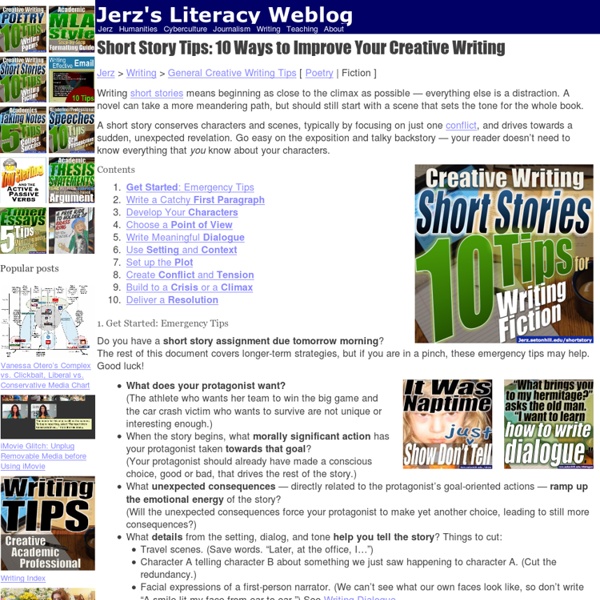Character meme fun!
This is how I was procrastinating during the exam period. "Post-processual theory? ...After I've cleared out my hard drive, I think... ... ooh!
Expanded Power Revision Checklist
Would you like to be a published poet? Would you like recognition for your work? Please check out the "Invalid Item" Part I of the Writers Workshop: Expanded Power Revision Checklist I first presented the content of this article at a writers workshop. Hence, the way this material is formatted and presented here is probably more suited to verbal presentation in a class with hands-on examples.
A Simple Novel Outline – 9 questions for 25 chapters « H.E. Roulo
Just as every tree is different but still recognizably a tree, every story is different but contains elements that make it a story. By defining those before you begin you clarify the scope of your work, identify your themes, and create the story you meant to write. At Norwescon 2011 I sat in on a session called Outline Your Novel in 90-minutes led by Mark Teppo. I’ll give you the brief, readable, synthesized version.
Active Voice Versus Passive Voice
Today's topic is active voice versus passive voice. Here's a question from Brian in Iowa. He writes, “It drives me crazy when people write in passive voice. How can I teach people how to tell the difference between passive and active voice and to stay away from passive voice?”
How to Write a Terrific Author Bio
Posted on Jul 5th, 2011 | 247 comments Sometimes it’s hard to believe how difficult it can be to write about yourself in a bio—after all, you’re a writer! But I understand it’s not as simple as that, so here are a few tips to make it easier. Write your bio in first person for query letters, third person for most other purposes including proposals, book jackets, article bylines. Make it professional but you also need to convey personality and writing style. Don’t try too hard to be funny, but include something that makes you seem like a real person.
The 100 Most Important Things To Know About Your Character (revised)
Quote from original Author(Beth):This list came about when, one day while struggling to develop a character for an upcoming Hunter game, my lovely roommate Nikki looked at me and said something like, "Wouldn't it be cool to have a list of questions you could go through and answer while you were making characters, so you'd make sure to consider all sorts of different elements in their personality?" I agreed, and that very evening we sat down over hot chocolate and ramen noodles to whip up a list of 100 appearance-, history-, and personality-related questions (which seemed like a nice even number) to answer as a relatively easy yet still in-depth character building exercise. Later on, we went through the list again, took out the questions that sucked (because there were a lot of them) and replaced them with better ones. What you see before you is the result of that second revision. Just don't email us specifically to tell us how much we suck.
How to Make Readers Feel Emotion
on January 30th, 2011 by Fiction Editor Beth Hill and last modified on February 8, 2011 I wrote an article on the importance of creating emotions in readers, but I’ve noticed that writers are looking for specifics on how to accomplish that. So, this article complements that first one, presents practical tips on how to stir the reader’s emotions. Readers like to be touched, moved, by story.
English 50 Exercises for Story Writers
English 50 – Intro to Creative Writing: Exercises for Story Writers Basic Theory: What is a short story? As soon as someone delivers a definition, some good writer will write a story that proves the theory wrong.




Kennedy, Kathy, and Dennis G. Jerz. "Short Stories: 10 Tips for Creative Writers." Jerzs Literacy Weblog. Seton Hill, 30 Mar. 2011. Web. 13 Jan. 2013. < by gregorypeters Jan 14